#after the fall of arnor
Note
Why do you think Aragorn as accepted as a King? They don't have blood tests to confirm his identity and he is not even from Gondor (was probally born here, but not raised)
Oh no Aragorn was not born in Gondor, canonically speaking he was born in the north amongst the northern dunadain and that is his cultural heritage. And not only that, Aragorn's claim to the throne is legally shakey at BEST. His only claim to the line of Meneldil (original King of Gondor after Anarion and Elendil's deaths) is through a female line, which used to be an accepted path to kingship in Numenor, but was since entirely discarded by both Gondor AND Arnor (so not even Aragorn's own direct ancestors agreed with letting women rule kingdoms) And a previous legal ruling on this PRECISE ISSUE decreed that Aragorn's ancestor DID NOT have a right to Gondor's throne. So yes it's a good question isn't it? There are two answers!
#1 Gondor is still a partial if not full theocracy. This is one of those aspects of the book that doesnt really make sense unless you understand all the character's actions through the lense of catholicism and religious faith in general. Aragorn is 'Estel' or 'hope', but when people say 'hope' in Middle-earth what they mean is faith etc.
In lotr meta-logic the divine right to rule is a real thing that actually exists, god (Eru) literally wants Aragorn to be king. The characters within the story are aware of this to varying degrees, Boromir being one of the few characters who properly disregards this and wishes to view Aragorn's claim on it's own merit. Even Denethor knows and understands that Aragorn is chosen by god, and he's very bitter and angry about it! (good for him). But in general, all other characters including all Gondorian lords are 'faithful' or 'elendili', and within this religion the only people who could be called 'priests', who can bridge the divide between man and god, are their Kings. So, religiously, if Aragorn IS sent by god to rule them, then they would be committing a kind of heresy to refuse him. And remember, god literally exists in Arda canonically and so therefore does sin and heresy, not just in a moral way but also in a literal like... fact of nature kind of way.
So when Aragorn arrives in Pelargir with an army of ghosts it gives Lord Angbor FAITH in him. When Gandalf, an angel literally doing god's will, is his friend and expressly supports his claim the other lords of Gondor also are inspired to have faith in him. Aragorn spends a good deal of time after the siege of minas tirith ticking divine checklists for 'guy who should be king', he is not making a legal argument for his right to the Gondorian throne, he is making a religious argument for his right to rule over the entire population of 'the faithful' which includes Gondor AND Arnor, destroyed or not.
There WOULD be discussion though! Not everyone in Gondor is dunadain and not everyone is faithful in the way that the dunadain are faithful. Culturally the northern and southern dunadain have been seperated for 3000 years and a lot of people would have issues with being ruled by someone so other to them, even if he had lived among them for 10 years (though that does help). But in the end the lords of gondor are almost all dunadain and they all have to abide by the tenets of their faith, or '''fall''' and become '''lesser men''' than even the rohirrim (terrible I know 🙄) so they really had no choice but to support Aragorn in the end.
However, reason #2
Minas Tirith's armies were absolutely decimated after a weeks long siege and war before that, and what few soldiers were left were exhausted and barely functioning. Aragorn arrived at their gates and broke the siege with a full army who'd only done ONE fight and told everyone he was king of Gondor. What was Imrahil gonna do, say no?
112 notes
·
View notes
Text
OKAY LORD OF THE RINGS HOT TAKE - I WISH THE MOVIES KEPT THE BARROW DOWNS
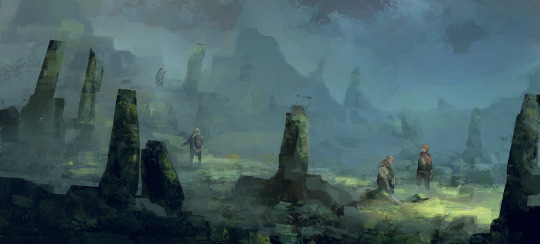
Art by: QuintusCassius
You don't have to keep Bombadil, they can find their own way out for the sake of pacing, but when I think about just how much this scene actually ties into the rest of the story's themes it becomes more and more of a shame it didn't make it in.
It introduces the idea of a land falling to shadow and establishes, in the most show-don't-tell way so far how intense the threat to the landscape itself the evil they're facing could be. This is a story about a war on the land as well, after all, and this land LOST. And it's NOT a far off land from their own home. Such shadowy devastation and evil and rot and despair is so close to their own home.
We learn these ruins belong to Arnor, an even greater kingdom of men than Gondor. Which, hey, is gonna become super relevant multiple times across the story - like when Boromir is pleading for help with Gondor's plight or talking about its strength, or when we see Minas Tirith under siege. And we KNOW that kingdoms of Men greater than it have fallen.
It establishes The Witch King really early and subtly. This doesn't even need to be mentioned at this point. It can be done the same way it's done in the movies RE Weathertop when Gandalf is explaining who The Witch King is. He can just explain it further. "He stabbed Frodo on Weathertop, and he laid low the Kingdom of Arnor." Flashback to Weathertop and the Barrowdowns.
This also makes it more significant, like it was in the books, that The Witch King is the one leading this army. He's destroyed a kingdom of men once before, he'll fucken do it again.
It makes Aragorn's defeat of him on Weathertop WAY more impactful! One of the Dunedain driving off The Witch King at the site of one of Arnor's greatest losses to The Witch King is a symbolic cue that though these are dark times, these are changing times.
And, of course, it sets up Merry's sword. Merry doesn't just have some random sword in the books. He takes a sword from the Barrow Downs, a sword of the Dunedain, and carries it through the ENTIRE STORY and that's what he stabs The Witch King with on Pelenor Fields. The books even have a paragraph briefly eulogising the sword and talking about the pride of the swordsmith who would never know that they made the weapon who undid their greatest enemy, wielded by a hobbit.
Like... Yeah, as a filmmaker and writer myself I FULLY understand that pacing is a vital thing to keep hold of. And The Fellowship of The Ring is perfectly paced. And deciding what to keep and what to cut is just... a nightmare that Peter Jackson and his team did better than anyone had any right to do.
But I think The Barrow Downs should honestly be talked about similarly to how we talk about The Scouring of The Shire. Its effects and thematic overtones are incredibly far reaching and important to the story and it's definitely one of those "it's a real shame it got cut" moments but I DO understand why they cut it.
80 notes
·
View notes
Text
The Sad, Sad Tale of The Druedain.
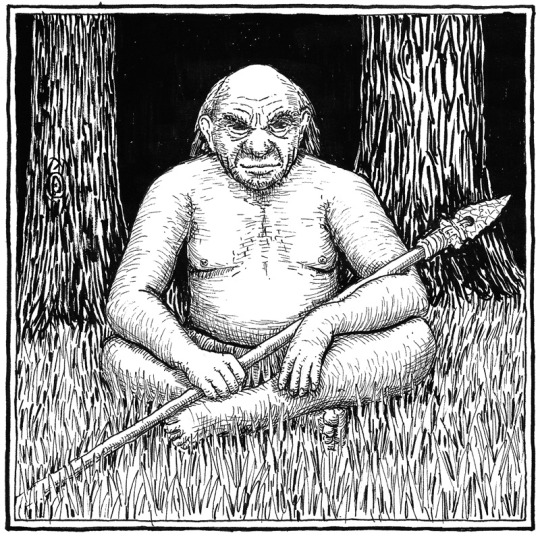
Amongst Tolkien's many, many Human peoples, the Druedain might be the saddest in my opinion.
Both for their current situation, their history that led to them to this point, their very real and tragic real life inspirations, and the way everyone still alive, Drunedain, Numenorean, and everyone else has forgotten their true history and it's signifigance.
The Druedain's origins go back to the First age, where they(or the ones of them who wandered west into beleriand at least)were one of the Human people who fought against Morogth on behalf of the Valar, and upon the war's conclusion, they like all the rest of these Humans were given the name Edain, and many wonderous gifts.
Long life, massive size and strength compared to regular folk, and an island paridise kingdom to live in.
They called this land Numenor, named Elros, son of Earendil as their first king, and settled their new home, and so, these disparate and formerly different men of many origins joined together and mixed, becoming the Numenoreans.
And the Dru who joined them became the Druedain, one of the founding people of Numenor.
We don't know how much the Druedain intermarried with the rest(being the only ones that were visually distinct from the rest by the end) but given they and other men intermarried already in the first age(Earendil and all his descendants have Dru blood in their veins for examole), it's rather certain that enough did that by the time Numenor fell, most if maybe not all had at least one Druedain ancestor.
Whatever the case of that may be, both in Arnor and Gondor alike, the legacy of the Druedain(The great hunters, scouts and trackers of the Numenoreans) live on in the form of the rangers of North and south, both groip with incredible skill in all related to stealth, wilderness survival and hunting.
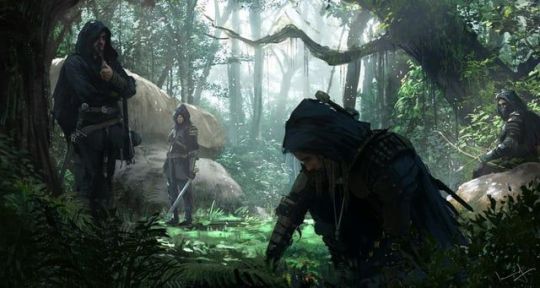
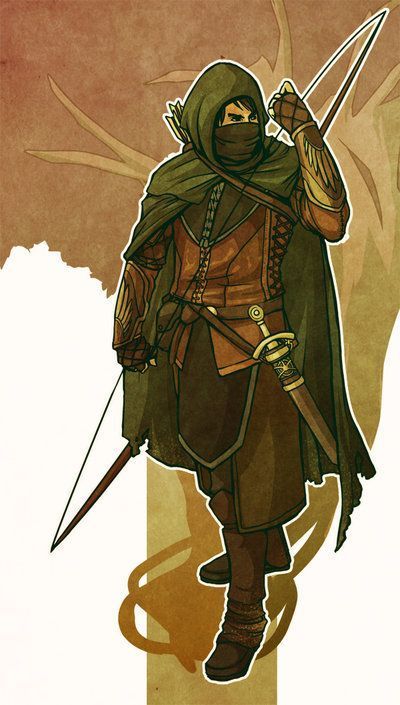
The skills of the wild that Aragorn displays was not learned just from personal experience. It, and the skills of all of rest of Dunedain, north and south were a distant, distant descandants of the Druedain's far greater, passed down through the ages until finally it ended up here, at the end of the third age.
Humanity is in truth, all one people, not many. They were split apart by unnatural means, and it is when Men combine their strength rather than let differences divide them, that they are truly strong.
But divided they were, for when the Numenoreans made contact with the outside world anew, after countless years of iaolation, the Druedain foresaw that their brethren would eventually fall to darkness, and so as they grew darker and darker, the Druedain began to sail back to Middle Earth, quietly, and rejoining the rest of the Dru, who had not left middle earth for Numenor.
And here we get into a usually overlooked tragedy, for during the dark years, when Sauron worked in Middle Earth, one of the people who opposed him and his were the Dru, now forever renamed the Druedain.
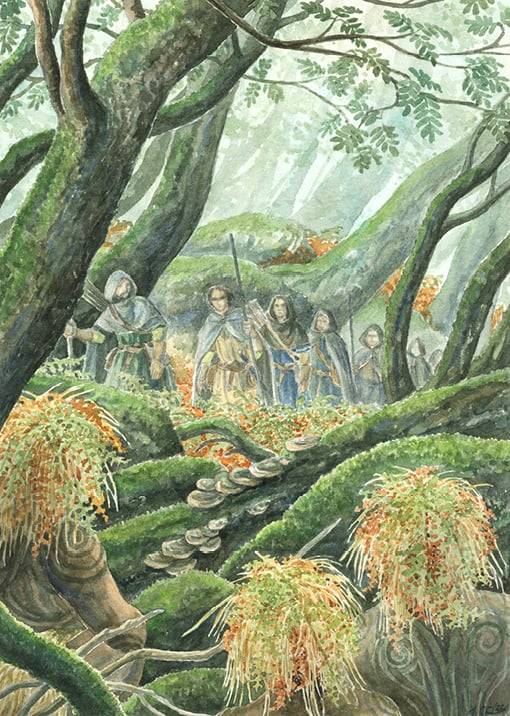
The image most fans have of Druedain was Tolkien obviously drawing inspiration from various primitive, tribal societies that Europeans encountered across the world during the age of exploration and colonization.
But that's not actually true, for the Druedain were inspired by two things, the first being the real life Woses, the mythical wild men of Europe's still untamed wilderness in medieval times.
But the second was the now forgotten native peoples of Europe, who nobody remembers anymore. And there are a lot of those, and most don't care to remember them any more.
For all the minorities of Europe who survived up to this day, many, many, many more were snuffed out forever by Europe's many waves of immigration and conquest, and nobody remembers them anymore, their culture forgotten, their languages dead, and whatever they made torn down and replaced by those who took their lands from them.
And so it is with the Druedain. For the state we see them in now, is not their "Natural" state so to say.
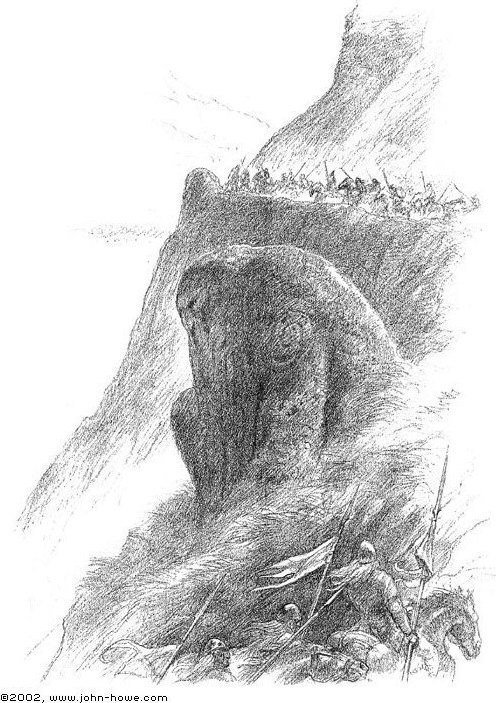
For the Druedain were also the true heirs of Numenor, as much as the Gondorians and the Arnorians ever were, and when they rejoined their distant kin, they helped them create a great and powerfull society, capable of raising massive and expertedly carved stone statues all across the lands that would one day become Rohan.
These are all that remains of their people's golden age, for these men who fought Sauron and his forces during the Dark years, were in turn conquered by another people who served sauron, and in turn took their lands from them, and built over their homes, and claimed rulership over these lands.

The ancestors of the oathbreakers of Dunharrow, drove the druedain into the hills and forests, where they were forced to live on nothing but hunting, and there they slowly forgot their roots, and were forgotten by all others.
Knowing all of this, it completely changes a lot of one's understanding of this People's oath to Isildur, and their ultimate rejection of it.
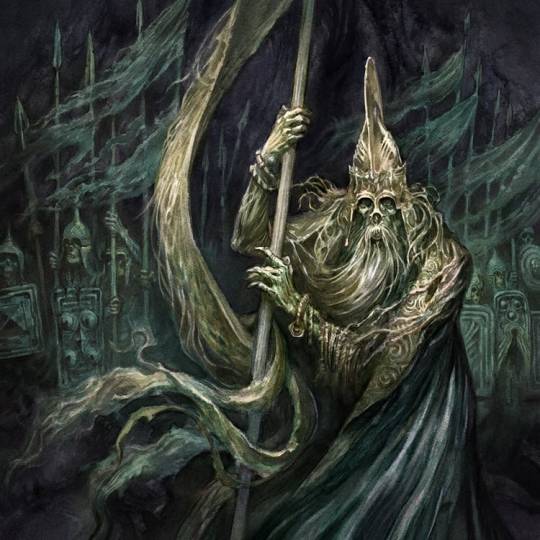
"Thou shalt be the last king, and if the west prove mightier than thy Black Master, this curse I lay upon thee and thy folk; to rest never until your oath is fulfilled. For this war will last through years uncounted, and you shall be summoned once again ere the end."
And such was the power of this oath, that upon breaking it, it destroyed their very spirit, and they fled and they hid in the mountains and dwindled and became fewer and fewer, and as the Druedain, they lost their homes, but not to sword, but their own cowardice and the gruesome power they had brought down upon themselves.
It's a very good tale, but when you know the background of all men, it becomes intimately intertwined with Tolkien's themes.
For what Isildur asked the mountain men, was to uphold their oath to fight sauron, and by doing so, earn redemption for their previous acts and crimes they did under his name.
And they refused to repent for their wicked ways and deeds and redeem themselves, and so they were cursed and destroyed... By a kinsmen of the people who's land they took by might and evil deeds.
There is something remarkably fitting about that.
However, justice did not heal the Druedain's wounds, for they did not come forth to join Elendil and Gil-Galad to fight sauron, as their ancestors had against Morgoth.
Instead they hid in their forest and hills, until such a time that they would be called upon once more, NOT by their kin, but a people who they had a personal and very real grievance with the Rohirrim.
For the Rohirrim became the stewards of their former lands after many other came and went, and they did not have a good relationship with the Druedain eitger, mistaking them for beasts or monsters, and turn hunting them...
But in the end, despite this, these two were able to make peace, and common cause, and bury the hatched. For though not direct kin as they were with the Gondorians, they were still both Human beings, they both fought evil, and by doing so, they both managed to survive and see another day and Age of peace and hope.
The tale of the Druedain is one of eternal sadness, but withouth hope. But it is a harsh reminder that important things, and people ARE forgotten. Good people can, and have been defeated, and evil folk can and have taken that which rightfully was theirs.
It's a bittersweet ending, like most things in the Legendarium.
#druedain#lord of the rings#the silmarillion#tolkien's legendarium#meta#numenoreans#edain#numenor#men of dunharrow#oathbreakers#rohan#rohirrim
12 notes
·
View notes
Text
Speaking of my undying grudge against Arvedui:
What I really think should have happened (in a better but still possible world) upon the deaths of King Ondoher, Prince Artamir, and Prince Faramir of Gondor:
The Council of Gondor, led by the Steward Pelendur, starts deliberations as to how the succession's going to work.
In Arthedain, someone (or some people) manages to talk Arvedui down. His father (the actual heir of Isildur) isn't prepared to attempt a long-shot claim to the crown of Gondor. And since Númenórean succession law followed strict gender-blind primogeniture*, under the old traditions Princess Fíriel would be the heir of Anárion, not her husband. She claims the throne.
In this better world, Pelendur et al actually give her fair consideration. Tradition matters a lot in Gondor. Númenor matters a lot. They don't want a foreign king, but Fíriel is Gondorian. And historically, bypassing royal princesses has not worked out for their people (most obviously with Tar-Míriel, in a subtler way with Princess Silmariën).
But while they don't want a Pharazôn situation, they also don't want a Herucalmo situation or Gondor being subordinate to Arthedain. They accept Princess Fíriel's claim with a number of stipulations that include her return to Minas Anor and strictly limiting the consort's authority.
After various negotiations, an agreement is reached. Fíriel becomes Gondor's first ruling queen and her son Aranarth succeeds her as heir of Anárion (though he is likely known to history by a regnal Quenya name).
The decision to defer to Númenórean law in Gondor would have far-reaching effects, including on the later succession. In my ideal version, the precedent is not understood as "daughters can inherit if there are no sons available" but as "the eldest living child inherits regardless of gender," as happened in Númenor (this is why Tar-Telperiën inherited despite having a brother).
The crowns of both Gondor and Arthedain would eventually fall to Aranarth, son of Fíriel and Arvedui, more or less uniting the kingdoms. I suspect the preservation of Arthedain would be a greater priority for Gondor in this scenario and it would actually be saved (I think the prophecy of Malbeth the Seer suggests that the salvation of Arthedain was possible, though these are not the specific circumstances he saw).
But canonically, Arthedain and Arnor follow strict male-line descent as much as (canon) Gondor (it's a huge deal to the Northern Dúnedain that their kings and chieftains are all heirs in an unbroken male line). If Gondor adopted the Númenórean system while Arthedain stuck to the patrilineal one, the kingdoms would be split apart the first time that the firstborn child of an heir of Fíriel and Arvedui was a girl (rule of Gondor going to the firstborn and rule of Arthedain going to her eldest brother). But it may be that Arthedain's traditions also changed in the AU, in which case it wouldn't be an issue.
This would also mean that the privileging of male-line-only descendants would be way less of a thing, at least in the royal house. The heirship would pass through oldest surviving children regardless of whether they were male or not, so even if the world was still similar enough that the same people even exist by the end of the Third Age, male-line-only heirs would not have seniority in this AU. The heir of Anárion and Isildur by the time of the War of the Ring could easily be ... like, Halbarad.
(Obviously there are all sorts of other consequences, too! But those are the ones that entertain me the most.)
---
*To be more specific, Númenórean succession law followed strict gender-blind primogeniture after the (relatively) early king Tar-Aldarion. Aldarion instituted the change to allow his daughter Ancalimë to inherit and (for whatever reason) to give elder children preference over younger ones without regard to gender. Thus, as mentioned above, Tar-Telperiën received the scepter rather than her younger brother Isilmo. Tolkien noted that if Tar-Aldarion's law had been followed from the beginning, the lords of Andúnië would have been the royal family, since their foremother, Princess Silmariën, was the firstborn.
#anghraine babbles#plotbunnies!#ondonórë blogging#legendarium blogging#legendarium fanwank#arvedui critical#fíriel daughter of ondoher#pelendur#númenórë#long post
10 notes
·
View notes
Text
WIP Round-Up
Ty @aislingdmdt for the tag!
Tagging anyone who'd like to play!
rules: post the names of all the files in your WIP folder, regardless of how non-descriptive or ridiculous. let people send you an ask with the title that most intrigues them and then post a little snippet of it or tell them something about it!
Game of Thrones/ASOIAF WIPs
Falsehoods -- a re-telling of True or False from Roose's PoV (Roose Bolton x OC of House Frey
Aftercare -- sequel to Therapy (Roose Bolton x Fat Walda Frey)
Untitied trilogy of three intersecting stories:
Sprung from Good Seed -- Barristan Selmy x Perriane Frey fic that begins during the Greyjoy Rebellion and extends to the end of ASOIAF
Above the Rest -- Jason Mallister x OC, overlapping timeline with Sprung from Good Seed
Family, Duty, Honor -- Brynden "Blackfish" Tully x OC of House Frey, overlapping timeline with Sprung from Good Seed
What Storms May Blow -- Barristan Selmy X OC of House Frey, I started this in 2017 and it is probably 80% done. I'd really like to finish it!
Stardew Valley
She Walks by Moonlight -- werewolf AU, Marlon, Gil, Farmer story narrated by Gunther
Kink -- one-shot follow-up to Dig Deep featuring Marlon/Riley.
Stardrop -- Marlon/Riley one-shot for Lilyy on GFS. Marlon gets Riley a Stardrop for her birthday.
Untitled Sequel to Dig Deep -- Several years after the events of Dig Deep, Linus passes away and Marlon and Riley help guide Gil through his grieving
Untitled Wizard fic -- OC Natasha comes to Pelican Valley to work as the editor of the new paper, the Pelican Times. Same universe as Dig Deep. Natasha explores the more supernatural storylines of SDV as Riley doesn't have a supernatural bone in her body. Rivals to lovers trope featuring Wizard x Natasha
Special Ballot -- Marnie/Willy fic. Willy teaches Marnie how to fish, Lewis gets jealous and raises the taxes on the beach, making it impossible for Elliott and Willy to live and work there. There's only one thing Marnie can do -- run for Mayor in the next election.
One Weekend in Spring -- Leah needs a fake boyfriend to attend Kel's wedding with her. Who better than Elliott?
Good Soup -- Jodi/Gus fic. Jodi and Kent divorce. Jodi takes a job helping Gus in the kitchen. Romance ensues.
Untitled Pam redemption fic -- Pam finishes a rehab program in Zuzu City and decides not to return to Pelican Town feeling she is too much of a burden on Penny. Pam moves to Castle Village and buys a small horse ranch. She rents off various parts of the property in order to make mortgage payments, and finds a companion in the widower who rents the old barn for his woodworking endeavours.
Rings of Power
Respite -- either Elendil/Reader or Elendil/OC, takes place after the fall of Numenor as Elendil is establishing the kingdom of Arnor
10 notes
·
View notes
Text
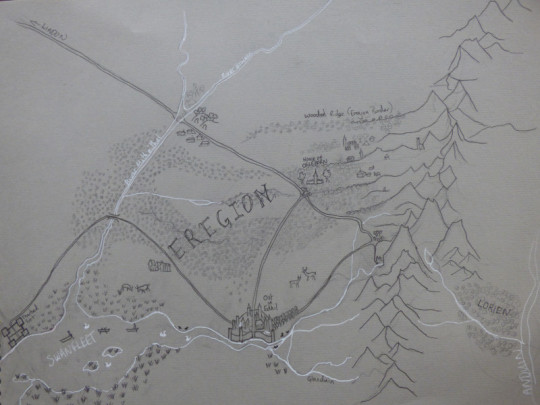
I have ended up writing more about Eregion again: specifically its fall, in Speak Friend and Enter. And I have another Second Age Eregion work slowly underway.
To help with all of this, I made a map of Eregion, aiming for the period around 1600 when the Ring was forged.
Here's the thinking behind it:
Eregion is largely a wooded landscape. Some of the trees have been felled to build the city of Ost-in-Edhil, and to provide fuel, but I think the woods would be preserved. Celeborn and his people came with Galadriel to establish Eregion, bringing Doriathrin forest agriculture skills with them.
Perhaps Galadriel has even tried planting mallorn trees here, though they did not take as well as they did in Lorien later, and vanished when there were no longer Elves in Eregion to look after them. The woods would be a source of materials, fuel, and bark, but also a place where the Elves would hunt, particularly deer.
At the end of the Third Age, when the Fellowship walked through Eregion, they noticed ancient remains, paved roads and worked stones. I am inclined to think some of these may have been Numenorean remnants from the early Third Age, rather than remains of Eregion, simply because of the 4760 years between the Fall of Eregion and the War of the Ring. Eregion/Hollin doesn't seem to be mentioned as being part of Arnor, but it is quite close to the Numenorean settlement of Tharbad.
(On the other hand, Eregion did specialise in the technologies of preservation, if the Rings are anything to go by. Still, a nearly 5000 year old road still recognisable as such tests my imagination somewhat.)
I am not sure if Elvish Eregion would have had the wide paved roads mentioned in Lord of the Rings. I think the roads I have marked on the map above were probably green roads, used for walking routes, occasional horse riders, and perhaps livestock droving, and that the paved roads may have come later.
Of course, the paved leading to Khazad-dûm with its wide climbing loops as described in LOTR, may have been a dwarf-road. The creation of loops to reduce the climb suggests that perhaps it was designed for use by heavy carts. There is no wide lake before the Doors, of course. That was created by damming the Gatestream, Sirannon, some time in the late Third Age.
At any rate. Tharbad does exist in 1600SA, but it's fairly new, and primarily a fort defending Numenorean timber extraction operations: there's no bridge yet, and the bogs and marshes along the line of the Swanfleet river are wide and shallow, with several small islands.
This land will all be drained later, either by Numenor, or perhaps by the new powers of Arnor and Gondor, building the road through Tharbad to connect Northkingdom and Southkingdom. But not yet. The forests that used to lie around the river Gwathlo have mostly been felled by Numenor, but there are some left, and most of those will be burned during Sauron's campaign.
I've given Celeborn a house outside Ost-in-Edhil. Given his well-documented distrust of Dwarves, I feel that he probably wouldn't be very comfortable in the city with the greatest friendship ever known between Dwarves and Elves. Also, during the fall of Eregion, Celeborn was present and joined Elrond's rescue force that was swept away into the north, to found Rivendell, and that would be more likely if Celeborn's usual haunts were at the northern end of Eregion. I've drawn his house with two long wings and a tower, and I'm inclined to think that the tower was Galadriel's idea, and was made of stone, but the wings were made of carven wood. There are other settlements scattered across northern Eregion through the woods, but no cities of any size: these are homes for Elves to use particularly in winter.
When the Fellowship stopped on the road from the Redhorn Gate, they stopped at a hill topped by a few trees, and ringed with large rocks. I've decided this was probably a way-meet, where two paths originally passed, and the trees are distant descendents of those planted by the Elves. The rocks might be remnants of late fortifications from the siege, perhaps linked to real-world myths about crossroads and waymeets.
The wide shallow bird-haunted Swanfleet is probably a useful food source for Tharbad, as well as the elves of southern Eregion and the Men of the great woods of Eriador. All of them hunt in the marshes for birds and eggs.
I think perhaps the Numenoreans of Tharbad (they all call themselves Numenorean, though even at this early date, some of them have never seen Numenor) mostly hunt on land, in the reedbeds. They are more comfortable with deep water ships than small boats.
The Elves of Eregion make long shallow punts that are driven with paddles or long poles, which allows them to hunt birds in season on the water with bows or falcons.
The marshes are also grazing land for cattle, the herds of the original inhabitants of the land along the Gwathlo river. They have been here for a very long time, long before Eregion was established, trading cheese, milk and leather with the dwarves of Khazad-dûm in return for metal: mostly in the form of knives, pots, pans and needles.
11 notes
·
View notes
Text
ERIADOR
Why is the Lonely Land so lonely? There's been some discussion of this on the discord server and I thought I'd try to sum up my thoughts.
But first, ERIADOR:
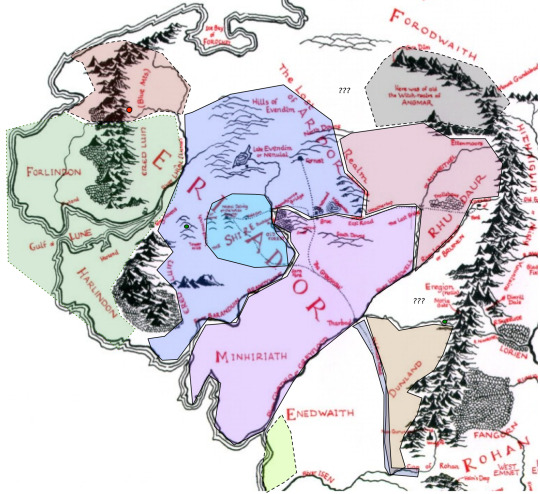
Base map cropped from Christopher Tolkien's, overlay by me. Long Tolkien Gateway-based discussion follows!
The green area in the west is Second Age Lindon (except pre-downfall-of-Númenor there was at least some more land west of the mountains, thanks loads Eru). Any time in the Third Age elves are occupying much less of this, but we don't know how much less, and there's no indication it was ever formally claimed by anyone else.
Off-red area north of Lindon was Second Age dwarf territory — it's possible dwarves also controlled the actual mountains in what is marked Lindon, but it's not stated. The red dot is the approximate location of First Age Belegost. It should probably be more in the mountains proper. Third Age I would guess their territory extended farther south? There was a dwarven kingdom-in-exile somewhere around there T.A. 2802-2941, but presumably dwarves living there both before and after.
You can see the Shire in light blue — boundaries are kind of a guess. It was established T.A. 1601. And then 'suffered greatly' in 1636 from the Great Plague. Rough start!
Angmar is in gray in the northeast. It lasted T.A. 1300-1975. Angmar's borders other than the south one are not entirely clear. They Grey Mountains are mentioned as the eastern border, but that takes us across the Misty Mountains? Anyway Angmar's capital Carn Dûm is noted, at the end of the Mountains of Angmar. There were supposed to be evil Men living there. Its forces also included orcs.
It's generally unclear what the northern border of Arnor was — or the effective northern border. It never seems to be defined, but they clearly weren't doing much when you get up into the Forodwaith. Too cold. Which is kind of weird when you consider that Forochel is at approximately the same latitude as Dorthonion and the ocean is right there NO I SAID I WASN'T GOING TO CONSIDER CLIMATE/LATITUDE/CHANGING OF WORLD. Ahem. There were people minding their own business up there, especially towards the coast away from Angmar.
Apart from its fuzzy northern border, old Arnor was bordered in the west by (south to north) the Blue Mountains/Gulf of Lune/probably River Lhûn. Then its, uh, southwest border was the coast, and its southeast border was Rivers Gwathlo/Mitheithel/Bruinen (a.k.a. Greyflood/Hoarwell/Loudwater) up to the Misty Mountains. It's not clear whether Arnor included what later became Angmar.
Arnor split up in T.A. 861 into Arthedain (northwest), Cardolan (south), and Rhudaur (northeast). There was some dispute between the three over the part of Arthedain around Weathertop, where Arthedain had the watchtower of Amon Sûl and accompanying palantír and the other two kind of wanted it.
Arthedain had the cities Annúminas (the old capital of Arnor) and (its own capital) Fornost. It included what were supposed to be the most populous regions of Arnor. The Shire is in Arthedain, though it was apparently mostly unused by Men by the time the Shire was founded (even though the Baranduin was previously a locus of population — clearly things were already not so great). Northern Arthedain didn't get hit as hard by the Great Plague. It was at war with Angmar off and on from T.A. 1356 at the latest until its fall in T.A. 1974.
Cardolan had two towns on its borders — Bree and Tharbad — but if it had a capital or notable locations of its own they aren't recorded apparently. Its defenses were broken and its last prince killed in T.A. 1409. After this most of the remaining Dúnedain of Cardolan holed up in what became the Barrow-downs and Old Forest. (The Barrow-downs weren't haunted yet but they were a gravesite, and, like, in the Old Forest? How'd that work out for them? Yeeesh.) There were still non-Dúnedain living elsewhere in Cardolan, but most of them died in the Great Plague in 1636. It was after this that the Barrow-downs got haunted, so presumably the remaining Dúnedain were gone, too.
Rhudaur really seems to have gotten the short end of the stick in terms of both size and kind of territory. Yes, they get to be neighbors with Elrond, but does that really make up for it? The territory breakup would be somewhat more equitable if Rhudaur originally included what became Angmar, but that's not clear, and it's not like that's particularly nice territory. Anyway, Rhudaur allied with Angmar sometime before T.A. 1356. It sounds like they did so officially sometime after T.A. 1349, when the king of Arthedain decided to claim overlordship of the other two on the grounds that they didn't have Isildur descendants anymore, but there must have been some sort of relationship before that. According to Arthedain there were only evil men left in Rhudaur after 1409, and there was no one at all in Rhudaur after 1975; there was 'a shadow on the land'. —Okay apparently the etymology of Rhudaur is arguably 'troll forest' or 'evil forest', which, really? I'm going to say it started as the alternate possibility 'east forest', and the other is a later folk etymology.
The uncolored area between the rivers and the mountains used to be Eregion, and doesn't seem to have been claimed by Arnor at all. Imladris is up at its north end, which is probably why Arnor set the border there, but I don't think there's much evidence Imladris was governing the region in any way. Khazad-dum was still active until T.A. 1981, but there's no evidence they did any governing, either. Not clear if anyone lived there.
Dunland… is Dunland. Its western border is unclear because it's supposed to be a road which isn't fully drawn on the map, and also the road curves towards the Isen in a way which would seem to preclude Dunland's southern border being the Isen? Also, how is Dunland isolated enough to avoid the worst of the Great Plague when one of its borders is the main North-South road? Does Dunland have an effective border of some miles east of the road? Anyway the Dunlendings' ancestors were chased there in the Second Age by Númenóreans and they've been there ever since.
Then we have the nice empty space marked Enedwaith! (Technically includes Dunland.) Enedwaith was not part of Gondor or Arnor; they 'had a joint interest, but apparently the only part they actually cared about was maintaining the North-South Road (indicated by the long skinny thingy) and Tharbad. Most of Enedwaith's pre-Númenórean occupants got chased into Dunland by the Númenóreans, but then the Númenóreans didn't really settle there either even in the Third Age. There were some Drúedain in the marshes towards the coast. Both Enedwaith and Minhiriath in Cardolan suffered devastating deforestation in the Second Age, but in the Third Age were apparently perfectly good grassland. —Technically speaking Enedwaith is not considered Eriador apparently? But I'm not sure what it is.
Okay, what else… The town of Tharbad is on the map. It was founded in the Second Age as an Númenórean fort/river haven, and there was a battle there, but after that was ignored for a while until Arnor and Gondor needed a road and a place to cross the Gwathlo. The whole area around the river convergence was really marshy — it was called the Swanfleet — but it was extensively drained to enable building a proper fortified town, a bridge, and causeways for the road on either side. Tharbad hung on after the Great Plague. It did not hang on after Fell Winter-related floods in 2912, presumably because all the drainage systems, dikes, etc. were destroyed in the floods and the area returned to its natural state as a giant marsh. There was still sort of a ford in the ruins of the bridge, but it wasn't a very good ford.
Aaaaand Bree-land, which probably I should have marked but it's just a really small area around Bree. The Bree-men have been living there since the Second Age — their ancestors fled Númenóreans — and just… carried on, all through the rise and fall of the North-kingdom. (For non-Númenóreans carrying on through the rise may be the more impressive part.) Bree was an active trading town and in the late Third Age saw travelers from all sorts of places! Bree-land was occupied by Men and later hobbits. Noted to be most westerly settlement of Men. Hmmm. Not sure I believe that.
Okay. I may have to come back, but I think that covers it.
Stay tuned for (at some point) "why is the Lonely Land so lonely?"
#a tolkien tag#arda geography and demographics#ardanalysis#reckless application of spackle#only not yet this is the concrete part
69 notes
·
View notes
Text
Almea is interesting because, despite being fantasy--originally of a very classic mold; it seems to have started out as much of a place for Zompist to set D&D campaigns as anything else--its author is clearly concerned with the mechanics of history: although there is no simple 1:1 comparison (Verduria is not an allegory for France; Ctesifon was not Rome; Xurno is not Russia), the way the world is presented, and the way in which the author explores it, meshes well with the major trends of our own world and how we understand them. Almea is a world you can make historical atlases of; it is a world with its own history of colonialism and international relations and a similar technological arc. It is, in short, a set of fantasy starting conditions (”what if three million years ago aquatic elves and swamp orcs fought an apocalyptic war, and in the aftermath a new hominid civilization tried to re-run Earth history”) whose consequence are worked out in a fairly Earthlike way.
You might contrast this with Middle-Earth--for all that Tolkien had a pretty good head for history and language, he’s much more interested in exploring his fictional history through the framework of legendary narrative. Zompist has the Historical Atlas and the Almeopedia; but Tolkien’s big work is the Silmarillion, a work of history which is primarily concerned with telling that history in the epic mode. You can’t really make a historical atlas of Middle-Earth--for one, it’s not detailed enough. Corners of the world which fall out of the story, like the outer provinces of Arnor after the collapse of the northern kingdom, basically just disappear. There might be something in the big gaps in eastern Rhovanion and Rhun, but it’s clearly not relevant to the stories Tolkien wants to tell, so we have scant sense of what that is.
Comparing different approaches to worldbuilding is interesting to me, because once you start doing that, you really expose how shallow the imagination is of people who think of worldbuilding as, like, a secondary accessory to “real” storytelling. It is a fairly common position that worldbuilding is, I don’t know, basically a second-order activity, an indulgence at best, and that the real purpose of worldbuilding is to provide a good foundation for “proper” stories, which the ends of worldbuilding ought to serve. To me, though, worldbuilding has always been an interesting activity in its own right. Often a much more interesting activity, because how you design a world, the internal and external logic you approach it with, and how you present the results of that design, will not only, as a matter of inevitable consequence, cause certain stories to emerge from that world, in a way that feels as natural as breathing, but will give a strong scaffold, a supporting superstructure that helps those stories fit together in a way that transcends their individual arcs and themes.
For example, all stories that you might tell about Almea are part of an analytic history of a fantasy world that is About what it means to approach a fantasy setting with the tools of modern historiography, political analysis, and sociology, as much as they are About the individual themes of those stories. All stories you might tell about Middle-Earth are About reclaiming the epic mode for modern fantasy, and the possibility of redemption in a world marred by suffering, as they are the Silmarils or the One Ring. Bad worldbuilding often is merely an adjunct to storytelling--and that’s how you get shared settings that feel like a hodgepodge whose elements have no coherent relationship to one another, because the story someone wants to tell comes first, and, well, they’re going to force it to work in the setting whether it’s natural to it or not. And even good writers can build (or contribute to) lousy, boring worlds using this approach.
42 notes
·
View notes
Text
The other way is of course to really lean in to the stupid game-y nature of it all and say like, "post apocalyptic survival and badebuilding game set just after the fall of Arnor, playing as the people who wound up establishing the Rangers" or something. That's funny as an idea but I think would fall into the trap of "not doing anything interesting with a very particular setting"
5 notes
·
View notes
Note
I need you to know that all of your arawen content whether it’s your actual fics or just your musings about them as characters is just completely correct. like everything you say is just like yes. exactly. i found myself in the dark at 3am nodding vigorously in agreement at my phone over your post about how much comedic potential they have and it’s a crime that not enough people are seeing that. like yeah I’m sure a big challenge arawen had after the coronation was restoring peace but you know what was probably the biggest challenge of them all? trying to interact with their subjects without having them all fall in love with them . They would have been like THE celebrity it couple. Work and rebuilding the city is probably done at an incredible pace but it’s literally because everyone is suffering from a huge fat crush and is desperate to impress them .. And it feels morally wrong but people have never been so motivated and productive before that aragorn and arwen kind of just have to allow it ??
so glad u have been enjoying my little spiral into whatever trench this is?!?!
u see my vision .... wow :')
you are so absolutely correct on this front tho i feel like celebrity is not quite the right word given its weird modern day connotations ... theyd be more like that couple in your local organizing space who everyone is in love with & caused at least three teenged moments of self revelation just by existing (which is… basically what they did for many irl but anyway lol). like its true that theyre the king and queen and im sure the reunited kingdoms of gondor and arnor do have some kind of gossip column going on. but i feel like aragorn especially would do everything in his power to throw them off the proverbial trail so that he and arwen can hang out at the yee olde gondorian community garden and plant more trees in peace
#anyway SO glad to hear we are on the same page#phil.txt#lotr#arawen#objectively speaking they hang out with The People this is basically canon
5 notes
·
View notes
Text
Thranduil Fanfiction
"Amongst Starlight"
Chapter One: "Arnor"
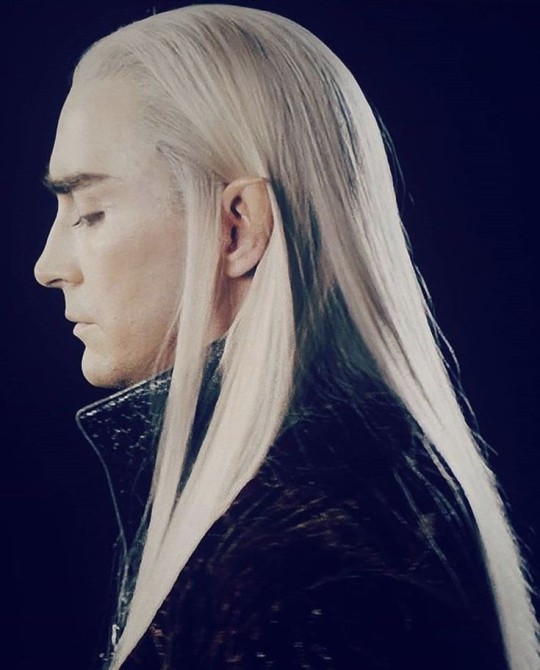
It's finally here! A few things:
-The main character is NOT Aragorn's mother, she is named after her.
-My elvish translation is a little shaky as this is my first fic using the language.
-Thranduil is officially present in chapter two, so he's coming, I promise. This is just an introductory chapter!
-I welcome all suggestions and discussion, so please feel free to comment below or send me a message! I hope you like it!
*if you would like to be tagged in future updates on this fic please let me know! I tagged a few of you below who already notified me*
*AO3 is giving me some trouble so it's not posted on my account yet but this is the rough copy*
@coopsgirl @tigereyesf @warriormirkwood
--------
In the Northeastern plains in the forests of Eriador lay the remnants of the ancient Kingdom of Arnor. Since the fall of Numenor, many tribes of its descendents hid themselves in the wilderness. Long had they avoided the orcs who patrolled their lands, living in peace while keeping their people safe. Rumors had emerged of a young prince, the son of one Arathorn, who had survived an orc raid and named the heir of Elendil. His true identity was hidden from many say for those who were close to the late chieftain of the north and the elves who kept him safe. In Rivendell he secretly dwelled under the name Estel and thrived under the care of the house of Elrond. The remaining men were called rangers by many in Middle-Earth and were rarely seen. They lived scattered across the north and concealed by the many woods and hills available to them.
Just east of the old ruins of Fornost lived a small group of Dunedain. They were a simple and humble people but kept mainly to themselves, avoiding contact with outsiders; making their home at the foot of the weather hills as a protective measure. Their chieftain was Talion and he ensured the safety and prosperity of his people. Deep in the woods of his realm is where our story begins.
The sun rose over the horizon in the early hours of the morning, the evening's dew still coating the ground. In the distance, the quick pounding of hooves could be heard as two horses raced through the winding trails of the forest floor, each with a rider on their back. One of the horsemen was a young woman, her auburn curls danced playfully along her back, shining like fire in the rays of the morning sunrise. She was clad in a deep green tunic and matching trousers, with brown boots laced up to her knees. She stood up in her stirrups and whistled, pushing her steed to a faster gallop. Her horse was a beautiful dark grey mare, a hand or so taller than her companion's mount who was only a few feet behind, trying to keep pace with her.
She kept glancing back at him and laughing at the hilarity of her lead. The young man behind her was older but similar in appearance, and taller. He did his best to encourage his horse to shorten the distance between them, but to no avail. As they continued to race through the woods, a white falcon soared above the treeline, following them closely. Around his ankles were a pair of jesses, woven lengths of leather meant to allow his handler to secure him when perched. His pale feathers danced as the breeze in the skyline passed by, and he let out an excited screech as he watched the mounted competition below him. The two riders sped through the valley and they ran into an opening where the river met a beautiful meadow. Once the woman crossed the water to the other bank, she pulled back on the reins, easing her horse into a gentle trot. Moments later, her companion crossed the stream and caught up with them, matching his steed's pace with hers. She glanced over at him and laughed, a proud smirk on her lips.
"It appears I have won, dear cousin. So you must uphold our terms," she teased. He shook his head in disapproval but smiled back at her.
"I'd hardly count this as a fair victory given you had a ridiculous head start," he mocked. She crossed her arms and rolled her eyes.
"It's not my fault that you didn't secure your saddle girth properly," she replied.
"You could have waited…" he said.
"Indeed I could have…but where's the fun in that?" she said back, chuckling along with him, "Or would you rather sort this out with a rematch if sorts?"
"Perhaps a sparring match would settle the scale… You win, I'll give you the information you want. But if I best you, you'll have to clean my saddle and tack for a week," he replied. She gave him a mischievous grin and dismounted, pulling a broadsword from a sheath at her side.
"Very well, but we both know who is more skilled with the blade," she teased and began to circle him, the sharp point of her sword pointed in his direction. He brandished his weapon and twirled it quickly in his hand, finishing his display with his elbow raised to his shoulder, blade at the ready.
"Come then, Gilraen, let's see these superior skills of yours…," he mocked, motioning with his hand to step forward. She tilted her head quickly to catch him off guard, then lunged at him, catching his blade against hers. He parried her blow and held her there, pressing the steel of their weapons together so she could not move. He slowly slid the edge of his blade up hers until it barely touched the cross guard.
"You'll have to do better than that…," he said, smirking at her. She pushed him off and stepped backwards, holding her sword's blade so the flat end was balanced on the back of her other hand. Gilraen was swift and impulsive with her blows, while her cousin favored a more defensive stance. For several minutes they took turns striking and parrying until one of them lost their footing. After blocking one of her swings, the young man tripped over his own feet and pummeled to the ground. His weapon fell from his hand and he lay flat on his back, her foot pressing on his chest. She playfully held her sword up to his neck.
"Surrender…," she ordered, smiling down mischievously at him. He raised his hands in defeat and laughed.
"Alright….I yield…," he replied. She sheathed her sword and offered her hand to help him stand. Brushing himself off, he secured his own weapon back at his side and walked over to his horse. He pulled a small roll of folded parchment from his saddle bag. She ran over and tried grabbing it from his hands.
"Come on then, let me see it!" she pleaded as he dangled it above her head just out of reach. Before their race across the countryside, Eothyn had mentioned that he had received news from outside of their realm regarding a summoning. Where or whom the message had been sent from was not mentioned. The agreement was he would share this information with her if she won.
"Patience…this is an official parcel and I'd hate for it to be ruined," he said, handing it to her. Before opening it, Gilraen noticed a familiar insignia in the wax seal. A bright star in the middle encircled by an intricate pattern of vines twisted beautifully around the border. It was the family crest of the house of Elrond; the message had arrived from Rivendell. Her eyes lit up and she excitedly looked at her cousin.
"This is a summons from Lord Elrond!" she said happily as he nodded in response. Unfolding the paper, she began to read the letter to herself. "Lord Talion, I am pleased to inform you all arrangements have been officialized. I have been on speaking terms with the King and he has agreed to travel to Imladris. We request the presence of you and your family in the valley so we can proceed with our agreement as discussed. In a few days time, I will send one of my sons to accompany you. I hope this letter finds you and your kin well. I look forward to your arrival. Elrond."
She looked quizzically at Eothyn, her eyebrows twisted with confusion. To her surprise, he seemed ashamed of the news and pressed his lips together nervously.
"What is this then? What arrangements is he talking about?....Eothyn?" she asked, waiting for an answer.
"I'm not supposed to tell you this…but there's something you should know," he replied shyly.
"What do you mean?" she asked.
"The agreement in question is marriage," he explained to her.
"And why aren't you supposed to tell me this?" she demanded.
"You have been chosen by Elrond and my father to partake in this arrangement," he said.
"Me?!" she screamed, "and you agreed with this? You're perfectly fine with me being handed off to some stiff nosed king?!"
"He's not just any King. He is the Elven King, Thranduil," he told her.
"I suppose that makes it all better then," she shot back, raising her arms in disgust.
"At least we have the opportunity to visit Rivendell again. Elrond is a dear friend and I know you've missed the beauty of Imladris more than any of us," he said, trying to calm her anger. He tenderly placed his hand on her shoulder. She gave him a small smile but he could see tears gathering in her eyes.
"Forgive me, I took my anger out on you…this is all so sudden and unexpected," she replied.
"I know…which is why I wanted you to know ahead of time so you weren't caught completely unaware," he told her. She paused for a moment and looked tenderly at him.
"For that, you have my thanks," she said and hugged him tightly. As he held his cousin there, the silence of the morning was broken by the mellow call of a small elven horn. She looked up at him and grinned cheek to cheek.
"They're here!" she shouted happily. Reaching for a small whistle in her pocket, she put it to her lips and let out a pattern of high pitched tones. In the skies above, a white speck began to grow into the shape of the falcon who had been following them. He screeched happily and she held out her arm, protected by a thick bracer made of leather, allowing him to land gracefully. Taking a dried strip of squirrel jerky from her saddle, she gave it to her falcon as a reward. She carefully stroked his back feathers with a sincere fondness.
"Shall we greet our friends from Rivendell, Astar?" she asked the falcon. He bobbed his head and neck quickly and chirped in agreement. Astar perched himself on her shoulder as she mounted her steed. Eothyn readied himself and his horse for the inevitable race home. She glanced over at her cousin with a mischievous grin while he wasn't looking and positioned her horse next to his. Carefully, she undid the buckle of his saddle girth as he was focusing on securing his belt and faced in the opposite direction.
"Race you back?..." she teased while winking at him.
"Only if we both start at the same time, and no cheating," he said back to her sternly.
"I wouldn't dream of it!" she lied. Coaxing Astar back onto her arm, she lifted her arm up, and he took off into the blue sky above. Her cousin placed his foot in one of the stirrups and hoisted himself onto the saddle.
"On my mark then," said Eothyn.
"Don't trust me, do you?" she asked, mockingly.
"Not for a second," he teased back, "three, two,...one!"
And with that, both horses took off as their riders squeezed their sides. Within a few feet of a full gallop however, Eothyn's saddle loosened and snapped off, causing him to fall off of his horse and into the grass of the meadow.
"You cheater!!!," he yelled after her as she galloped ahead.
"Never turn your back on an opponent, cousin!" she yelled back, laughing as she continued down the trail. Minutes later she entered the border of the forest and the small village of theirs came into view. Careful to watch for any children playing in the square, she made her way to the great hall, where her uncle Talion was waiting to greet them. Their guests had arrived just as she did and the villagers whispered with excitement as the elves dismounted. Glancing back behind her, she saw Eothyn leading his horse while carrying his saddle and smiled.
The commander of the company had long dark hair and grey eyes. He was clad in silver silk that draped over a beautiful suit of armor that was both light and sturdy. Indeed this was one of the sons of Lord Elrond, but it was not clear which one he was until the hood of his cloak was removed. There was a small scar on his left cheek that led to his ear. It was a battle wound from orcs when he and his brother rescued their mother from her torment. Before he could even reach Talion to greet him, she ran forward and jumped into his arms, embracing the young elf.
"Elrohir!!!! Mae Govannen, Hîr nìn! (Well-met/welcome, my Lord!)" she exclaimed joyfully. Elrohir lifted her off the ground and laughed happily in response to her greeting.
"Mae Govannen, mellon nìn! Le hannon! (Greetings my friend! I thank you!)" he said back, squeezing her gently and ruffling her hair. Setting her down he turned to Talion, walking over to him and placing a hand on his shoulder. Talion did the same to his elven friend and they nodded, smiling happily.
"Elrohir, Mae Govannen, Gi nathlam hí! ( You are welcome here!)", Said Talion, nudging the elf's shoulder.
"Mae Govannen, Le Fael (thank you/you are generous)," said Elrohir.
"Where is Elladan?" asked Gilraen. He smiled in her direction and began untacking his horse.
"My father has sent him to Mirkwood to accompany the King on the long road to Rivendell," he explained, "do not fret, he will be there for the festivities."
"Tolo ar nin (come with me), we have much to discuss before our departure!" Said Talion. Eothyn handed Gilraen his horse's reins and followed his father and their elven guests into the great hall. Before she could ask if she could join, the doors closed behind them. She huffed with frustration and blew into her small whistle to beckon Astar. Within seconds, the small falcon found his way to her arm and landed gracefully. He waddled up to her shoulder and perched on the leather padding, nudging her for a reward. She laughed and reached into her saddle bag for the dried meat and gave it to him. Stroking his wings, she looked back at the closed doors, knowing the conversation was about her future.
"I think it's perfectly indecent to plan a marriage without one's consent," she told him. Her falcon let out a small series of soft screeches which she interpreted as an agreement.
"You're lucky you do not have to worry about such things, Mellon nìn (my friend)," she told him, walking her steed and her cousin's back to the stable.
"I wonder what he's like…this elven king? From the little I have heard about him, he sounds callus and cold," she said, "what I don't understand, is why me? Why did he choose me?"
Astar tilted his head with curiosity as if he was just as stumped as she was. She took the horses into their stalls and secured them before safely putting the saddles back in the tack cellar. Grabbing a wooden bucket, she scooped a large portion of oats and grain and began feeding the horses their breakfast. A choir of hungry and excited whinnies echoed throughout the stable as she began to fill their feeding troughs. When she had finished, she took a broom and swept the alleyway, removing the dirt and stray pieces of hay from the floor.
A couple of hours later, Eothyn walked into the stable and motioned for her to follow him. Before she entered the great hall, Astar leapt off of her shoulder and flew over to a fence post to perch. She entered to find the elves and her uncle gathered around a large table in the center of the room.
"Gilraen. We apologize for the secrecy but we wanted to make sure all was in place before telling you," said Talion, pulling out a chair for her to sit in.
"Tell me what? The news of my apparent betrothal to the elven king?" she asked snidely. Eothyn immediately blushed and looked away from his father.
"How did you…?" he asked, his eyebrows twisted in confusion.
"Eothyn told me already," she shot back.
"Of course he did," he replied angrily, glancing over at his son, "that summons was confidential."
"She was going to find out either way," said her cousin. Talion gave him a cold and piercing side glance.
"That will be enough from you, boy," he said, nodding towards a chair, "sit please and kindly remain silent for the rest of this discussion."
Eothyn did as his father asked him, making a point to slam the chair on the ground before sitting. Gilraen held in her laughter as best as she could, covering her mouth with the palm of her hand. Elrohir and the other elves glanced around awkwardly, taking care not to get involved in the conflict. Talion cleared his throat and composed himself before speaking again.
"Many apologies, gentlemen. I believe Lord Feren has an official statement from the elven king to deliver before we begin with the proceedings," said Talion, gesturing to an elf across the table. Gilraen did not recognize him and noticed he was wearing duller tones than the elves who had come from Rivendell. His hair was almost as red as her own, but it was straight and fell over his shoulders with a neat elegance. He seemed nervous and a bit fidgety in the company of his kin, but stood and spoke with authority. He bowed in the direction of Talion and then Gilraen.
"My Lord,....my lady…, indeed I do. If you will allow me to do so, I will read it aloud," he replied, unrolling a sealed scroll. Talion nodded in approval and motioned for him to continue. Before he could begin, Gilraen interrupted the silence with her disapproval.
"If this is an official statement of the king's intent to marry, should he not deliver it himself?" she asked sarcastically. Feren swallowed hard and looked over at her uncle, setting the parchment back on the table.
"I beg your pardon?" he asked with a tone of shock.
"He has chosen me as his wife, has he not?" she replied.
"Gilraen…a great honor has been bestowed upon our house. You will address the king's council with respect," said Talion.
"It's alright, Talion, let her speak,"said Feren,"you have been chosen, my lady yes."
"Does he not want to meet his bride in person? Or is he too busy to bother with pleasantries?" she asked with a scowl on her face.
"Many apologies my lady, but the king thought it best to conduct the personal introductions in Rivendell," said Feren.
"Did he?" she asked, mockingly.
"He wanted to ensure everything was conducted properly under Lord Elrond's guidance," he replied sternly, "now if you please, I would like to get back to reading this so we can continue with all the proceedings."
"Very well…," she said.
She sat there crossing her arms, annoyed and partially embarrassed for the way she had spoken, but nodded in agreement.
"Thranduil Oropherion, King of Mirkwood and Lord of the woodland realm, thanks you for accepting his offer of marriage. By accepting these nuptials, the following will be granted to you and your kin: you will be given the title queen of Mirkwood and thus have free reign of the forest and the surrounding realm of the Elven kingdom. You will leave behind your home in Arnor and take permanent residence in the woodland realm. The remaining kin left behind will be granted an annual sum of gold to insure their security and survival. All Gilraen's living expenses and personal needs will be funded in full. No family dowry is expected for payment, and will not be required for Gilraen's agreement. The king wishes you well and looks forward to meeting you once you arrive in Imladris," said Feren, rolling up the scroll.
"That is quite a generous gesture is it not, Gilraen?" Talion asked, glancing over at his niece. She shifted uncomfortably in her chair and shrugged.
"If you say so…," she replied.
"Excellent! I believe we have an accord, Feren," said Talion reaching across the table to shake the elf's hand. Feren happily followed suit, sealing the young woman's fate when their hands met.
"King Thranduil will be pleased. We should leave for Rivendell soon to make arrangements for the marriage," said Feren before sitting down. Elrohir then stood from his seat, and addressed the room.
"My company and I will be happy to lead your family safely to Imladris, Lord Talion," said the young elf.
"We would be most grateful. I will see to it that the lady and my family are packed and ready to leave at first light," Talion replied happily. The company of elves stood along with their leader and bowed reverently at Gilraen and her family. She and the rest of the Dunedain present stood in response and bowed as well.
"Abarad (until tomorrow)," said Elrohir before leaving the hall. Once the elves had left, Talion slammed his fist down on the table, making Eothyn and Gilraen jump.
"What on earth was that for??!!!" he yelled at Gilraen.
"What?!" she said back.
"Your behavior in that council was completely out of line!" he screamed.
"My behavior?! And I suppose planning an arranged marriage behind my back is perfectly acceptable!!" she replied angrily.
"You are of age and it is time for you to step up and accept your duty as a woman in this household," he said sternly to her.
"Oh, Is it also my duty to accept any proposal blindly just because my choices are made for me!?"
"I promised your father I would look after you and ensure your future is taken care of. This is what he would want for you!"
"DON'T YOU DARE ASSUME WHAT MY FATHER WOULD WANT!" she screamed, pushing her chair to the floor," he would allow me to speak for myself and choose my own path!"
"He is NOT here, Gilraen. I am your guardian and you will do as you are told!" yelled Talion. She walked up to her uncle until their noses were nearly touching. Her face was red and tears began to pool in her eyes. Her lips trembled as she spoke, but the fire in her eyes remained.
"He would be ashamed of you…" she said in an aggressive whisper, pain in her voice. Talion could not speak, and lowered his head in silence, her words like an icy dagger in his heart. She began to weep and left the hall, her cheeks soaked with salty streams of tears. When she had slammed the door behind her, Eothyn touched his father's shoulder and smiled.
"Let me talk to her. She just needs time," he said to Talion. His father nodded as he watched his son chase after Gilraen. He shook his head and exhaled with frustration.
"What am I going to do with her, brother? Please give me patience," he spoke to the empty room, as if his deceased sibling was still there.
#lee pace#king thranduil#amongst starlight#thranduil fanfiction#thranduil oropherion#king of carven wood and stone#king of mirkwood
23 notes
·
View notes
Text
Silmarillion Primer: The Edain
The Edain (Ee-day-in) are men who came west over the Ered Luin (Blue Mountains) and fought with the elves against Morgoth. Although the name Edain is a Sindarin word that simply means Men, it is usually only used in reference to the noble people of the House of Bëor, the House of Haleth and the House of Hador and their descendants.
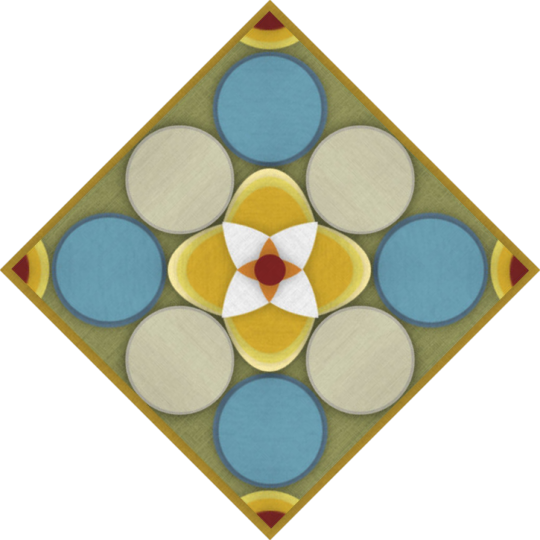
Art by Heget
The House of Bëor
The first group of Men to come west over the mountains of Ered Luin, were of the House of Bëor. Bëor, known as Balan to his people, came west in search of the High Elves or the Valar, for his people had heard rumors of them in the east. Finrod Felagund was the first elf to encounter them as they camped in the region of Ossiriand just west of the Ered Luin. There was a language barrier between the two, but they could eventually understand one another since their language was based on the old elvish of the elves in the east.
Finrod moves The House of Bëor out of Ossiriand and into the land of Estolad in the realm of Amrod and Amras of the Sons of Fëanor. Bëor became a vassal of Finrod and went to live with him in Nargothrond. The descendants of Bëor would ever be friends with the House of Finarfin, Finrod’s father.
Bëor’s fourth great grandson, Barahir, would save Finrod at the Dagor Bragollach. For which, Finrod gave him what would be known as the Ring of Barahir, a token of their eternal friendship. That ring would be passed down to his son Beren Erchamion,and then through the generations from father to son until the end of the Third Age. When it would come to King Aragorn II Elessar of the Reunited Kingdoms of Arnor and Gondor.
Notable Members of The House of Bëor:
Beren Erchamion- The Son of Barahir, he would travel into the Guarded Realm of Doriath and fall in love with Luthien, the daughter of Thingol and Melian, its rulers. He would brave the dungeons of Angband with Luthien to claim a Silmaril. His son would become the Ruler of Doriath, and the Father of Elwing, Eäredil’s wife and the grandfather of Elrond and Elros.
Morwen- 1st Cousin Once Removed of Beren (His Cousin’s Child), she married Hurín of the House of Hador. Bore him three children: Turín Turambar, Lalaith, and Niënor.
Rían- 1st Cousin Once Removed of Beren and Cousin to Morwen. She married Huor of the House of Hador, the brother of Hurín. They had one child: Tuor.
Through the marriage of Elwing to Eärendil, the two Houses of Bëor and Hador would produce the Kings and Queens of Númenor. The Númenoreans known as The Faithful would be primarily descended from the House of Bëor, and by extension the Dunédain of the North.

Art by Heget
The House of Hador
The third house of the Edain to migrate west of Ered Luin. They were initially called the House of Marach, after their patriarch. When they were given the lands of Dor-lomín as a fief under Hador Lórindel, the name of the House became The House of Hador. They were the largest of the three Houses of the Edain. They would intermarry with the House of Bëor and together these two house would make up the majority of the Men of Númenor.
Notable Members of the House of Hador:
Hurín Thalion- He was a great hero of men and a great friend to Turgon, High King of the Noldor and ruler of Gondolin. He and his brother, Huor, were brought to the city by the eagles of Manwë, which began that friendship. He would marry Morwen of the House of Bëor and have three children. One of which was Turín Turambar, who would also be a great hero of men. However, Hurín was captured at the Nirnaeth Arnoediad (Battle of Unnumbered Tears) and refused to tell Morgoth where Gondolin could be found. He was cursed by Morgoth to watch all the evil that befell his children. When he was finally released, he unknowingly led Morgoth to the general direction of Gondolin. Thus, preparing the way for Gondolin’s ultimate destruction.
Huor- brother of Hurín and of the House of Hador. He married Rían of the House of Bëor. They had one child, Tuor. He was friends with Turgon of Gondolin. At the Nirnaeth Arnoediad he and his brother bought Turgon’s army time to flee by holding the Fen of Serech. He would fall in that battle. He never met his son.
Turín Turambar- The only son of Hurín and the heir to the Lordship of Dor-Lomín of the House of Hador. He would go on to do great deeds, but the wrath of Morgoth followed him always, causing all he did to go astray. He would eventually kill Glaurung the dragon, but he would take his own life shortly afterward when he learned that last bit of evil the dragon had done to him.
Tuor- The only son of Huor. He grew up with Sindar elves in Mithrim before being driven by fate to seek for the hidden city of Gondolin that his father and uncle once visited. His errand was to advise the High King of the Noldor, Turgon, to abandon the city while there was still time. Turgon heeded it not, but he did give Tuor the hand of his daughter, Idril, in marriage. They became the second union of Elf Maid to Mortal Man. He had one child, Eärendil.
Eärendil- The Great Mariner. His family managed to escape the destruction of Gondolin and make it to the sea near the Mouths of the Sirion. There he married Elwing, who was a refugee of the destruction of Doriath at the hands of the Sons of Fëanor. They had twin sons, Elros and Elrond. He took the Silmaril that Elwing had inherited from her great grandfather, Thingol, and asked the Valar to save Elves and Men from the forces of Morgoth. He then became The Evening Star, wearing the Silmaril on his brow as his ship sailed the skies.

Art by Heget
The House of Haleth
The reclusive house of the daughter of Halad. There is not much to tell of them. When they came west of the Ered Luin, they refused to live in Estolad with the Houses of Bëor and Hador. They lived apart from them in the further north.
However, they were surprised by orcs and much of their people were destroyed. They removed to the forests of Brethil in the realm of Doriath and did not participate much in the wars of The First Age. They were, however, not friends of Morgoth.
Hurín would, in his grief over the loss of his family, cause the destruction of the House of Haleth, for blamed them in part for the ruin of his son. He would lead the remnants of the House of Haleth to the ruins of Nargothrond, where he would abandon them. Few members of the House of Haleth survived the end of the First Age to become a part of the Númenoreans.
The most relevant member of The House of Haleth, was the Daughter of Halmir, Hareth. She married Galdor of the House of Hador, and was the mother of Hurín and Huor.
#the lord of the rings#the silmarillion#tolkien#Bëor#Haldor#Haleth#House of Bëor#House of Hador#House of Haleth#Beren#Hurín#Huor#Turín#Tuor#Eärendil#Morwen#Rían#Balan#Finrod#Turgon#Idril#Elwing#Elrond#Elros#Dior#Thingol#Silmaril#Númenor#Silmarillion Primer
18 notes
·
View notes
Text
Of Isildur and Faramir
Now this might just be me wanting two of my favorite characters to parallel each other, but I really think that Isildur and Faramir are quite similar. The first thing that comes to mind is that they both lost their father and brother during an Age ending war, but I think that it goes deeper than that.
I mean, they are both heavily associated with the moon. Isildur’s name means servant of the moon and his fortress is called Minas Ithil. Then you have Faramir who is a ranger of Ithilien and later its’ prince. This is on top of Faramir’s defining character moments, such a rejecting the ring and sparing Gollum, take place at night and he learns about Boromir’s death at night as well. The cloak that he gives Eowyn and symbolizes his love for her looks like a night sky. With how connected the moon is to night itself, it is clear that his connection to night is also the same connection to the moon that Isildur has.
Along with this, they are both supporters of kings. Neither the Lords of Andunie nor the stewards are meant to be kings of their own right, but rather a part of a line descended from the line of kings. They are both, however, thrown into a time period where they need to more than that and take it in stride. Isildur does it by saving a fruit from Nimloth and Faramir does it by gaining knowledge by learning from Gandalf. They then both continue to fulfill their roles as supporters even after their respective roles. Isildur takes the time to teach Menedil how to be king before going to Arnor where he himself would be king. Faramir readily gives up the title of ruling steward in order to support Aragorn’s claim to the throne. They both choose to ignore a chance for themselves to gain more power in order to support the rule of someone they care about.
Then you have things such as Faramir dreaming of the great wave that Isilur escaped or the fact Ohtar and Beregond take on similar roles through their endless loyalty to their lords, but the real question is: what does this mean?
Well, it is another example of how power is bad at the end of the day. Now, I could probably go on and on about the fall many monarchies throughout the history of Middle-Earth is a sign that monarchies and the power that they is bad, but this is not really about. It is about the fact that Isildur did not die until he did eventually head toward Arnor to claim a throne. Even though he had been king of both Gondor and Arnor previously, his focus during that time had been to train Menedil to be king. When he makes the decision to take power for himself, no matter what his reason, that is when falls using the One Rings - a hint of the corruption that would have grown inside him if he had made it to Arnor. Now contrast this with Faramir who does seek power, but is given it through Aragorn. He is able to live a long life with Eowyn because he is not someone who wishes for a throne of his own and he completely rejects the Ring. He is able to reject corruption itself - not because of his nature since he has the same nature as Isildur - because he does seek out power at all.
#faramir#isildur#gonna also add that they're both trans#there is no world where either of them is cis#lotr#the silmarillion#tolkien
9 notes
·
View notes
Text
My LotRO Characters
Because I haven’t made a post assembling them all yet. So meet the team!
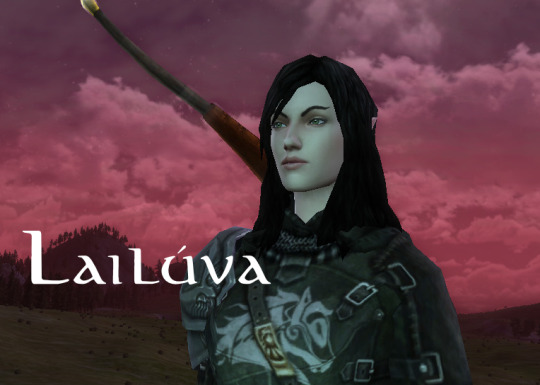
Elf hunter, my main and darling, started in 2010 and still going strong. Born 600 years before the War of the Ring in Rivendell, her parents’ death at the hands of goblins drove her to always help the Free Peoples as much as she could, along with her deep love of Middle-earth and all its wonders. Her hobbies include learning new languages, trying every alcohol ever made, and throwing herself off cliffs to find new places on the map.

Shieldmaiden of Rohan aka Mortal Woman Guardian, my secondary main and my tribute to my favorite kingdom of Men. An ordinary farmer living with her family in Rohan, she went west when an old friend of her father’s, the Ranger Amdir, asked for aid and she went in his stead and quickly found herself tangled up in the War of the Ring, particularly the affairs of Rangers and anything affecting her beloved homeland.
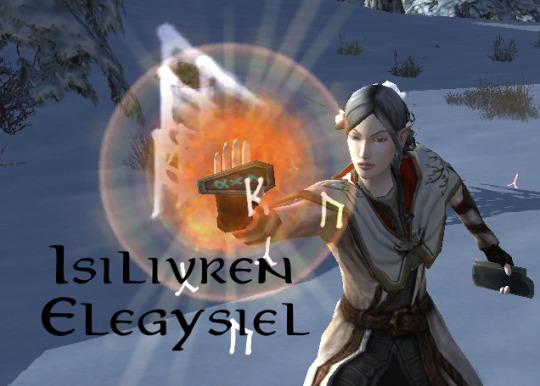
Elf Rune-keeper, favors lightning. Born in Brithombar six thousand years ago, she fled the fall of Beleriand with her sister and made it to Lothlórien, which became her beloved home. She studied rune-craft under many masters, but only when her sister’s granddaughter, Lailúva, persuaded her did she finally get involved in the War. Her main goal is to protect her precious homeland and she has little tolerance for Mortals, but there is a good heart under there somewhere.

Mortal Woman Champion, hailing from Minas Tirith. Born of an illicit affair between an archivist and a knight, she grew up with a foot in both worlds, pursuing scholarly matters along with serving the White City by taking up arms when needed. Her studies led her to discover that Isildur’s Heir yet lived, and she rode west to try and aid him in protecting Gondor and restoring it to its former glory.

Mortal Woman Warden, a citizen of Harad. When her tribe refused to submit to Sauron they were slaughtered; she escaped and found herself in Gondor, land of her hated enemies. A kind Ranger of Ithilien provided her with food and shelter, and from there she was able to journey to Eriador, where she quickly found herself caught in the affairs of Rangers and Wizards and more.
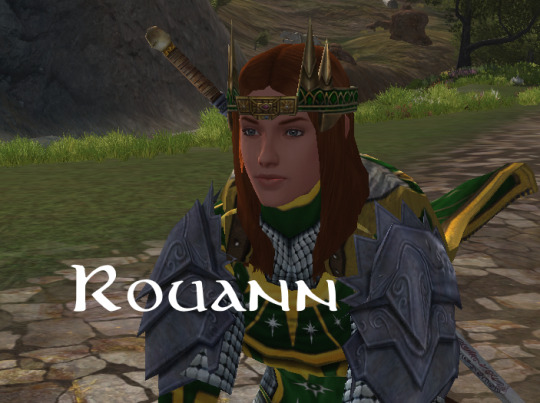
Mortal Woman Captain, born and raised in the Dale-lands. Her mother was a simple herbalist who found and rescued an injured Ranger far abroad; the affair that followed resulted in Rouann, unknown to her father who left to return home. After her mother’s death from illness, she headed west to try and find her father, but soon found herself heading east again. She has a strong connection to the Dwarves, having Erebor as a neighbor, and is quick to assist in Dwarven affairs when asked. She disdains criminals, but still develops a soft spot for a certain burglar.
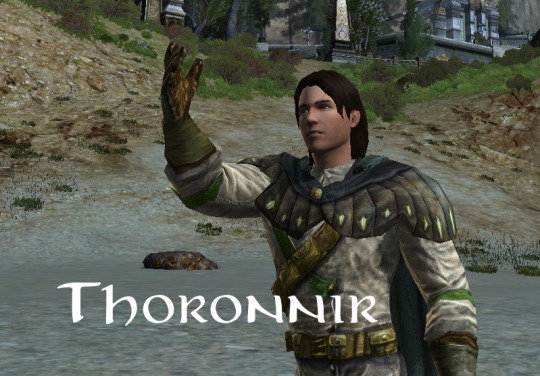
Mortal Man and Burglar of the Men of Arnor. Thoronnir was orphaned then raised in Evendim by his kin, the Wardens of Annúminas, but soon fell in with brigands and the Blackwolds. In Archet, Aragorn gave him a choice: seek redemption with the Dúnedain or be regarded as an enemy and no more henceforth. Thoronnir chose to turn his path back to aiding his people and working against the enemy, although he remained notorious for sticky fingers. Part of his motivation for shaping up was when he fell for the beautiful red-headed Captain who pursued him longer and more thoroughly than any law-man ever had before.

Hobbit Minstrel of the Fallohides. Snapdragan was a fairly ordinary Shire resident, fond of food, drink, and good cheer. Crossing paths with a certain Baggins and company on the wrong night got her involved in more than she meant, but she is always glad to lift the spirits of her friends. She has a knack for attracting various woodland creatures, and storing more food than should be possible in a saddlebag.
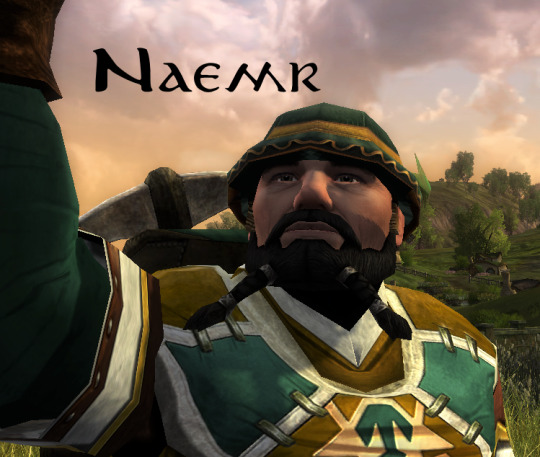
Dwarf Rune-keeper, born in the Blue Mountains to Erebor refugees. Odd for a dwarf, he preferred books and runes over the forge and gemstones, but nevertheless put his interests to good use. His parents returned to a reclaimed Erebor but he stayed in Ered Luin, the home he knew, and helped protect and reclaim it from the Dourhands. From there he found himself involved more and more in the War of the Ring.
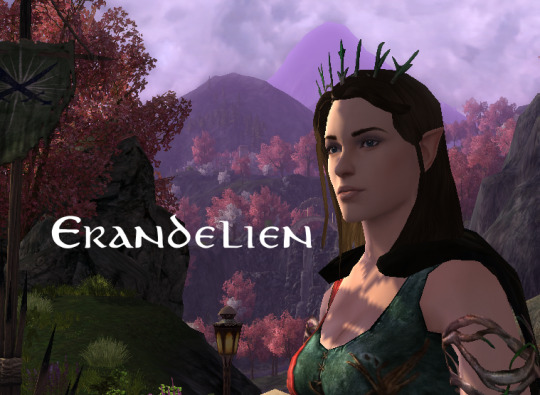
High-elf Lore-master, spent most of the First Age in Doriath. She loves all living things but has a special affinity for animals. She prefers to wander and explore, doing her own thing, and it was a complete accident she made it out of Beleriand before its destruction. She quite likes Radagast and her priorities are usually similar, focusing less on the big War things and more on being an Elf hippy. She is kind and helpful when called upon but even other Elves think she’s a bit of a weirdo. She doesn’t mind, though.

High Elf Captain but technically supposed to be a regular Elf, I just wanted to play with High Elf more. Born and raised in Rivendell, she is one of its high-ranking guards and takes its protection seriously. She rarely leaves, but when she does can be seen on Ascardal, her night-black horse. Because she is based on a childhood OC, she is also romantically involved with Elrohir, but things are mostly on hold so they can both focus on serving and protecting the Elves of Rivendell and all Free Folk during the War.

Female Stout-axe Brawler, born a slave in Mordor and then escaped. I wanted to try a Stout-axe and Brawler and if you follow my art blog, you know I’m salty over losing a certain favorite character because of the actress’ behavior, and a character born to punch? Let’s name her after Cara Dune. Like her namesake, she has bitterness over the hardships she’s endured, but there’s a good heart there and given the chance, she rises to the occasion to join the good guys in fighting the bad ones.
#long post#sorry bout that#lotro#lord of the rings online#lailuva#helwynn grimwight#isilivren elegysiel#helwynn#isilivren#mahtarnis#narali#rouann#thoronnir#naemr#snapdragan#snapdragan greenhill#erandelien#argilrian#karaduun
5 notes
·
View notes
Text
Since I haven't really stopped shaking my head about all the changes Amazon made when they adapted Tolkien's stories about the 2nd Age, I have also thought about how an adaptation with The Lord of the Rings appendices as a basis could be done differently.
The 2nd Age:
The Rings of Power and the Downfall of Númenor
I have many ideas abiut a possible adaptation of the 2nd Age that is closer to Tolkien's writings. However, I won't go into details because there exists a really good video about this.
Actually, if I only had the rights to The Lord of the Rings incl. the appendices and not to the 2nd age texts from Unfinished Tales and The Silmarillion, I probably would not go for the 2nd Age at all. The majority of Tolkien's writings about the 2nd Age is in texts outside of The Lord of the Rings, and if I would not be allowed to properly adapt Tolkien's 2nd age stories because of rights, then I would pick something else.
So instead, let's go to a promising time in the 3rd Age, since most information about the 3rd Age can be found in The Lord of the Rings.
The 3rd Age:
The Angmar War and the Fall of Arnor
Let's go to the years 1940-2050 of the Third Age. In this time
in Arthedain, Arvedui marries princess Fíriel and becomes King of Arthedain. But the kingdom is overrun by the armies of the Witch-king and eventually falls. Arvedui dies, but his son survives.
in Lindon and Rivendell, Círdan, Elrond and Glorfindel defend Eriador against Angmar, together with Arthedain.
in the Shire, the hobbits elect the first Thain.
in Moria, the Balrog awakens and the Dwarves flee, eventually establishing the kingdom in Erebor
in Lóthlorien, Nimrodel and Amroth fall in love and decide to travel south. On their travels, Nimrodel is lost, and Amroth drowns, and Galadriel and Celeborn take up rule in Lóthlorien.
in Gondor, the king and his sons are killed by invading Wainraiders. The next king sends his son Eärnur against the Angmar in the North, resulting in the defeat of the armies of the Witch-king. When the Nazgûl come to Mordor and take Minas Ithil, they challenge Eärnur and he is never seen again after accepting and meeting their challenge. The rule of the stewards in Gondor begins.
Why this part of Middle-earth's history?
110 years:
Compared to the time compressed in Amazon's show, 110 years is basically nothing. If needed it could even be shortened to only 59 years from 1940-1999, and only the final confrontation of the Witch-king and Eärnur would be lost.
Elves, Dwarves, Hobbits and Men:
All major races of Middle-earth are involved thanks to the presence of the Men of Arthedain and Gondor, the Elves of Lindon and Rivendell, the Dwarves of Moria, and the Hobbits in the Shire.
Many canon characters to pick from:
Canon characters include Círdan, Glorfindel, Elrond, Celebrian Nimrodel, Amroth, Celeborn and Galadriel among the Elves, Durin VI, Náin I and Thráin I among the Dwarves, Bucca among the Hobbits, and Arvedui, Fíriel, Ondoher, Eärnil II, Eärnur, Aranarth and more among Men.
Antagonists can include the Witch-king and other Nazgûl, the Barrow-wights, the evil Men of Rhudaur, the Wainraiders, Orcs, and the Balrog.
Known elements to attract the casual viewer:
characters like Elrond, Celeborn, Galadriel and the Witch-king
places like Rivendell, Moria, Lóthlorien and Gondor
the exploration of the origin of the Rangers in Eriador
the exploration of the history of Minas Ithil
the beginning of the rule of the stewards in Gondor
the awakening of the Balrog
the palantíri
Not-yet-seen elements to surprise the viewers:
exploring of the kingdom of Arthedain including its characters, culture, and its capital Fornost
exploring the Elven realm of Lindon and getting to see some of Tolkien's famous Elves properly for the first time
exploring Moria before its fall
getting to know the kingdom of Angmar and its capital Carn Dûm
exploring the concept of Barrow-wights
exploring other Mannish cultures like the Wainriders and the Lossoth
Possible storylines to tell
Storylines from Tolkien's writings:
Arthedain
Prince Arvedui marries princess Fíriel of Gondor.
When Fíriel's father and brothers die, Arvedui claims Gondor's throne since by Númenorean law Fíriel would be ruling queen, but the claim is rejected. Arvedui becomes King of Arthedain after his father's death.
The threat of Angmar grows, and Arvedui asks Gondor for help. But Angmar attacks first and captures the capital of Arthedain, Fornost. Many flee to Lindon, but Arvedui holds out at the North Downs for a while before fleeing to the Dwarf-mines in the Blue Mountains.
Eventually Arvedui flees further North, reaching the Icebay of Forochel were he meets the Lossoth. When Círdan sends a ship to get him, he is warned by the Lossoth not to get on the ship but ignores the warning. The ship sinks in a storm, and all aboard die.
Before his death, he gave the Lossoth the Ring of Barahir to thank them. The Ring is later on ransomed by the Dúnedain.
the Shire
During the war, most of the Hobbits went into hiding.
Some Hobbit archers were sent in support of the King, but they never returned. Some Hobbits als went to the last battle at Fornost when Angmar was defeated.
The Hobbits elect Bucca as the first Thain of the Shire in the absence of a King in Arnor.
Lindon & Rivendell
Angmar is kept at bay for a while thanks to the Elves of Lindon and Eriador.
After the fall of Arthedain,Círdan learns of Arvedui's escape route from Arvedui's son Aranarth and sends a ship North, which never reuturns.
Círdan of Lindon and Glorfindel of Rivendell regroup with Eärnur of Gondor, and together their armies defeat the armies of the Witch-king at Fornost.
When the Witch-king flees Glorfindel foresees that he won't be killed by the hand of a man.
Aranarth decides for his son to be raised in Rivendell.
the Shire
During the war, most of the Hobbits went into hiding.
Some Hobbit archers were sent in support of the King, but they never returned. Some Hobbits als went to the last battle at Fornost when Angmar was defeated.
The Hobbits elect Bucca as the first Thain of the Shire in the absence of a King in Arnor.
Lóthlorien
The story of Amroth and Nimrodel, ending with Nimrodel being lost and Amroth dead.
As a result, Celeborn and Galadriel come to Lóthlorien and take up rule there.
Moria
The Balrog awakens in Moria and Durin VI is killed.
Náin dies a year after Durin VI, and the Dwarves flee Moria.
The Dwarves come to Erebor, where Thráin I establishes his kingdom.
Gondor
Gondor is attacked by Wainraiders, and King Ondoher and his two sons fall in the battle north of the Morannon. Eventually, the invasion is stopped under the leadership of Eärnil, Captain of the Southern Army.
After rejecting Arvedui's/Fíriel's claim to the throne, Eärnil is crowned King.
Vorondil, later steward of Gondor, hunts down the Kine of Araw and creates the Horn of Araw.
Eärnur, Eärnil's son, arrives in Anor by ship with the army of Gondor. Together with the Elves of Lindon and Rivendellhe attacks the Witch-king in Fornost. Angmar is defeated and the Witch-king flees, but humiliates Eärnur.
The Nazgûl come to Mordor and take Minas Ithil. The Witch-king then taunts and challenges Eärnur who is King by now. Eärnur accepts the challenge and rids out to meet him, but he is never seen again.
The stewards start ruling Gondor.
Possible storylines to develop:
Was Arvedui's and Fíriel's marriage a political marriage or did they marry out of love?
Did Fíriel survive, and if so, how and where?
How did Aranarth escape and where did he go? What was his relationship with Elrond that convinced him to have his son raised in Rivendell?
Who among the Dúnedain went North to Forochel to get the Ring of Barahir back?
How were the Hobbits in the Shire affected by the war against Angmar?
What was the story of the Hobbit archers at the last battle of Fornost?
What made the Hobbits elect Bucca as the first Thain?
What was Celebrían like and what was she up to at that time? Was she in contact with her parents? What where her children doing?
What was the relationship between the Elves of Rivendell and the remaining humans in Rhudaur?
Where were Celeborn and Galadriel before eventually going to Lóthlorien, and what where they doing?
What was the relationship of Durin VI and his son Náin I?
After the awakening of the Balrog and the death of Durin VI, the Dwarves remain in Moria for a while. Where they still unaware of the Balrog, were they trying to fight it, or were they just too stubborn to leave?
"All evil things were stirring" – was the balrog roused by the digging of the Dwarves or because Sauron's power was growing again in Mirkwood?
How did Nimrodel and Amroth fall in love with each other?
What happened to Nimrodel?
How where Galadriel and Celeborn received in Lóthlorien?
Who created the sword that would eventually kill the Witch-king in the battle of the Pelennor fields?
... and many many more.
An adaptation would probably profit from a little rearrangement of the timeline – for example having the Balrog awaken a couple of years earlier than it did so that the Dwarvish plotline can run at the same time as Arvedui's. Since it is only a couple of years, there are no noticable effects on events of characters – at best it even provides a reason why the Dwarves did not help the Elves and Arvedui against Angmar, and why the Elves of Rivendell could not provide any assistance against the Balrog.
... so, this was fun. 🙂 And I guess based on my current knowledge I should be happy that nobody attempts to mess up this fascinating part of the Appendices in any adaptation...
#LOTR#The Lord of the Rings#LOTR adaptation#random thoughts#excercise in not being negative all the time but trying to be constructive in my critisism
3 notes
·
View notes
Text
is me Dealing With Allergies & having a brain the consistency of soup a good time to make rift of nurz ghashu conspiracy theories? probably not. am i going to do it anyway? yes!
granted tho this is just me working stuff out for fics bc i need data before i decide whether or not to completely ignore said data
anyway. the rift. what the heck is going on there, right? we’re ignoring all the loot you get because that’s a whole other ballgame
the whole thing has Very Gondor/Arnor architecture, but tons of ruins and there’s even a coliseum too so it’s definitely numenorean/numenoreans’ descendants flavored (honestly look at the sheer scale of the rift it’s HUGE) but the really interesting thing (for me) is that in the rift raid there’s a pretty chill member of the eldgang that you talk to called Asmolf and he says all this:

most importantly: the city wasn’t Always Like That, so we can probably assume that it wasn’t a case of carn dum being actively built over nasty stuff and the nasty stuff happened after
the eldgang made it into the rift after something called ‘the great destruction’ but thaurlach was there before them and was imprisoned sometime after and is still imprisoned.
“the Great Destruction” is a point unto itself honestly, but i’ll get to that in a second.
Glathlirel also says this later on in the raid:
"Long ago, at the breaking of Thangorodrim, Thaurlach flew to this land and I gave chase. At his coming, all was beset with brimstone and flame, and he eluded me. For long years he lay hidden, until the Dark Power rose again and Thaurlach awoke from his secret slumber. He was revealed to me in that moment, and I struggled with him in battle. With the aid of the wizards I threw down my foe: defeated, but not slain.
the breaking of thangorodrim happened roughly around 587 of the first age and sauron didn’t start bulking up in mordor [secretly] until 1000 SA and didn’t declare himself openly until 1600 SA, which was also when Glorfindel and the two Blue Wizards came to Middle Earth.
with all those points made, that brings me back to the Great Destruction: what can cause cities to “fall to the earth?”
earthquakes? maybe! but the way that asmolf refers to it as The Great Destruction makes me think that something a little more intense is going on.
so originally arda was flat until the fall of numenor [during 3319]. the reason numenor was drowned is a pretty long story that i don’t want to get too in depth here but the short version is that eru ended up creating an enormous rift between numenor and aman which numenor itself was swept into and then the flat world bent back upon itself and to meet at this rift making arda now round.
presumably this caused all kinds of wacky natural hijinks, probably like flooding and earthquakes where there really wasn’t any of either before, and if there were earthquakes before the earth got made round, they probably weren’t on such a magnitude as what would happen from the world being bent into a sphere.
since thaurlach ended up hiding himself so well that even glathlirel couldn’t find him for a while, it’s possible the numenoreans built the city in their early years* not knowing he was there since he only seems to have woken up due to sauron’s shenanignans in mordor.
*anywhere from SA 750 onward until SA 1300ish? because the former is when Aldarion started the guild of venturers, especially since there’s mention of pre-fall-of-numenor numenorean outposts & such that littered middle earth in the second age and it's possible that some didn't last very long and were abandoned pretty early due to reasons such as: no profitable exports, the land just kinda sucks/not good for growing things, etc etc.
so, tldr: what i think happened was: thangorodrim broken > thaurlach runs from beleriand into angmar > hides really well > Numenor founded > aldarion begins voyaging > the numenoreans are starting to really expand into middle earth > city in the rift founded > the settlement there didn’t do so hot so the numenoreans left > sauron is back, oops > the blue wizards arrive and help glathlirel imprison thaurlach > everyone chilling for a while > oh no numenor is gone, thaurlach is still imprisoned, somehow, but the rest of the rift is extremely messed up > the eldgang arrive.
or something to that effect, listen i just needed somewhat of a timeline for a bit in a fic
#sticky note tag#worldbuilding#ish idk man listen#i just.#many rift thoughts for fic none rift facts#idk why but i can totally completely ignore canon#but if canon is vague on something i can't just. fill things in because I Have To Know First
5 notes
·
View notes